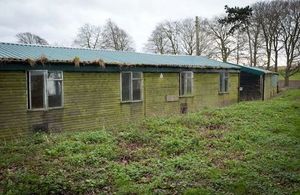Improvements to training facilities at New Zealand Farm Camp
DIO is investing £2.4 million at New Zealand Farm Camp on Salisbury Plain Training Area in Wiltshire, to bring it in line with modern day and future training requirements.

Existing training facilities at New Zealand Farm Camp, Salisbury Plain. Copyright: Landmarc Support Services. All rights reserved.
The investment will see 12 buildings demolished and replaced with 11 multi-functional structures, known as ‘stone tents’.
The new facilities will provide a modern, multi-purpose training camp that can be used as a Forward Operating Base or to replicate a terrorist camp, refugee camp and a Non-Governmental Organisation Base, or as part of a complex manoeuvre environment. It will also provide an exercise base for troops training in the local area.
Working in partnership with Landmarc Support Services the project will also involve improving the surrounding infrastructure with tracks and hardstandings which are being upgraded to support the Challenger 2 Main Battle Tanks, Warrior Armoured Fighting Vehicles and the new AJAX fleet.
Street lighting and a new public address system will also be provided with provision for military personnel to remotely plug in to a Field Electrical Power Supply (FEPS) generator.
WO1 Jeff Elson, DIO’s Training Safety Marshall at Salisbury Plain said:
DIO’s priority is to support our armed forces by delivering the facilities they need to live, work, train and deploy on operations. The investment being made in upgrading New Zealand Farm Camp is the biggest single investment in a training camp on Salisbury Plain since Copehill Down village in the late 1980s. The diverse training features that will be incorporated into the site will benefit our training troops as they will enable a variety of exercise scenarios to be undertaken.
Clive Paxman, project manager at Landmarc Support Services said:
Landmarc worked closely with end users and other stakeholders during the design programme to understand the specific requirements of this facility, which was first used for training during World War 2. This collaboration will ensure that we are jointly able to create facilities that will meet the diverse training needs of our armed forces, in the most sustainable and cost-effective way.
The project is due for completion in July 2016.